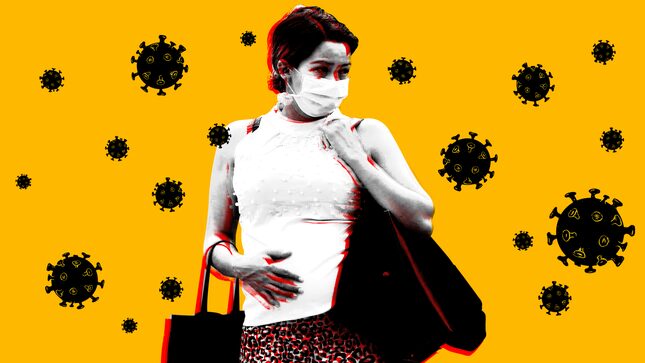
Illustration: Jim Cooke (Photo: Getty Images)
The classic pregnancy book What to Expect When You’re Expecting lists a few common questions women ask themselves before their baby’s due date, including “Can I work until I deliver?” and “Will I know labor when I feel it?” (Answers: yes, and probably.) Some questions not covered in the book: “What if my obstetrician has been called away to care for covid-19 patients?”, “Should I have a home birth to avoid the hospital?” or “Can babies catch coronavirus?”
Though no one really knows the answers to these newer questions, pregnant women and their partners—not to mention obstetricians, doulas, midwives, and lactation consultants—are scrambling to figure out how to navigate birth despite the uncertainty. The potential impact of this healthcare crisis goes beyond the more obvious issue of contracting covid-19. Women in danger of losing their pregnancy or suffering complications as well as those with preexisting conditions might find their provider is too inundated with calls from other concerned patients to adequately help her understand her unique circumstances. Many of the women I spoke to who fit these descriptions said their doctors haven’t offered any specific advice for them or made an effort to be in greater contact. Pregnancy is difficult enough, but dealing with it as a pandemic rages in the background adds a new dimension of stress, which has been linked to multiple negative outcomes of pregnancy, and could potentially have long-lasting health ramifications for both mother and child.
Some pregnant women have considered changing their birth plans to avoid a hospital, both because infections notoriously linger there and they’re worried that our facilities will soon be as overburdened as China’s or Italy’s, where a surge of cases in the north has meant specialists have been pulled off their regular wards to focus on covid-19 patients. Jada Shapiro, childbirth educator and founder of boober, an app that connects parents to pre- and post-natal care, said that across her vast personal and professional networks, expecting couples are panicking. “People are definitely scared, they’re definitely asking, ‘are there any alternatives [to hospital-based care]?’” (To check on this, I called the Brooklyn Birthing Center, New York City’s only freestanding birthing center, and Director of Midwifery Trisha Williams confirmed they had seen an uptick in inquiries; homebirth midwives in New York, San Francisco, Los Angeles, and Seattle reported the same.) Shapiro hasn’t definitively told her clients to switch their plans: giving birth at home or in a birthing center means doing so without pain medication, and is usually an experience women prepare for months to endure. But she did publish a blog post suggesting that women plan to “birth in place” for longer than they originally anticipated and purchase a “just-in-case birth kit” (including sterile gloves, a bulb syringe, and a baby cap) so they’ll have necessities on hand if they can’t travel or be admitted to a hospital.
Michelle Gabriel-Caldwell, a doula and owner of Baby, Please Birth Services in New Jersey, has gone a step further and started actively recommending women fewer than 20 weeks pregnant strongly consider a home birth. She added that one of her four current clients is set on switching to a birth center, but her husband is less keen on the idea. But Dr. Tristan Bickman, an OB-GYN who delivers in the Los Angeles area, told me she doesn’t agree. “I do not recommend switching to home birth or a birthing center, not yet anyway,” she said. “Each hospital has their own set of guidelines that are evolving every day and, as of right now, it has been proven safer to remain in the hospital.”
-

-

-

-

-

-

-

-

-

-

-

-

-

-

-

-

-

-

-

-

-

-

-

-

-

-

-

-

-

-

-

-

-

-

-

-

-

-

-

-








































